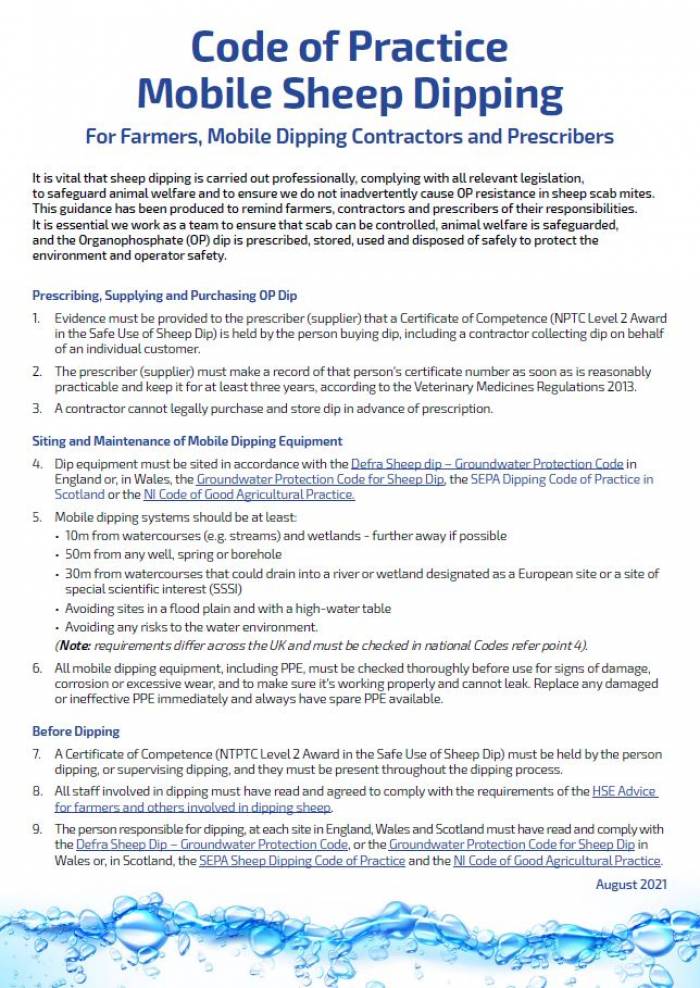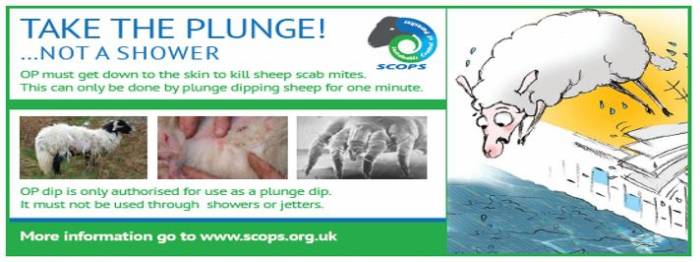27th July 2021
A new Code of Practice has been launched by the Sustainable Control of Parasites in Sheep (SCOPS) group, in conjunction with the National Association of Agricultural Contractors (NAAC), to ensure access to the best advice on effective treatment of sheep scab with organophosphate (OP) sheep dip, minimising risks to users and the environment.
Confirmation of resistance in sheep scab mites to the injectable macrocyclic lactone (ML) scab treatments, coupled with increasing concern that the use of these products is accelerating resistance to the MLs in gut-worm populations, means more and more sheep farmers have been turning to OP dipping for the treatment of sheep scab.
In contrast, the number of farmers with their own dipping facilities has continued to fall, due to tighter regulation of the purchase, use and disposal of OP dipwash. This means they have increasingly been turning to professional mobile dipping contractors – highlighting the need for support to those service providers.
Reflecting the cross-industry reach of the SCOPS group, the new code has been developed by in conjunction with a number of industry partners, and is for everyone involved in the dipping process – from prescribers through to the end users on farm.
Phil Stocker, National Sheep Association (NSA) Chief Executive, highlights why such partners viewed the iniative as being of such importance. He says: “If we are to safeguard the future of OP dips against the risk of scab mites developing resistance to the dip and protect the people involved and the environment, we must ensure dipping is carried out properly. This code, has the backing of organisations throughout the industry and offers reliable and responsible guidance to all those involved in mobile dipping, including farmers, prescribers and dippers.”
Bryan Lovegrove of the Animal Health Distributors Association (AHDA) supports this view. He says: “The code brings clarity and understanding to what is required in the safe storage, prescribing and use of OP dips by both contractors and sheep farmers. OP dip is a vital treatment against sheep scab and the code will encourage best practice.”
Stephen Dawson, Animal Medicines Training Regulatory Authority (AMTRA) Secretary General, adds: "All sheep medicines, including OP dips, must be prescribed and used responsibly. AMTRA supports this initiative, which will enhance standards and ensure OP dip used by professional contractors. It should be read by all Registered Animal Medicine Advisors (RAMAs) and others involved in prescribing OP dips so that they can play their part in ensuring OP is used correctly”.
Jill Hewitt, NAAC Chief Executive, says: "This code will help sheep farmers and dipping contractors work in partnership to ensure high standards are always met. Mutual agreement is vital on sourcing dip, siting the mobile dip and the disposal of the used dip to ensure the whole job is done safely, legally and without harm to the environment. A simple written agreement is recommended so that everyone is clear of their responsibilities.”
Mark Cokayne, Bimeda UK General Manager, commented: ”As a manufacturer of OP dip, we are delighted to support the new code. It represents significant progress in the fight against sheep scab in the UK and is a positive step towards protecting the efficacy of the only available active against which sheep scab mites have currently demonstrated no resistance, while also ensuring human and animal welfare and safety.”
SCOPS fact check

Additional information: -

